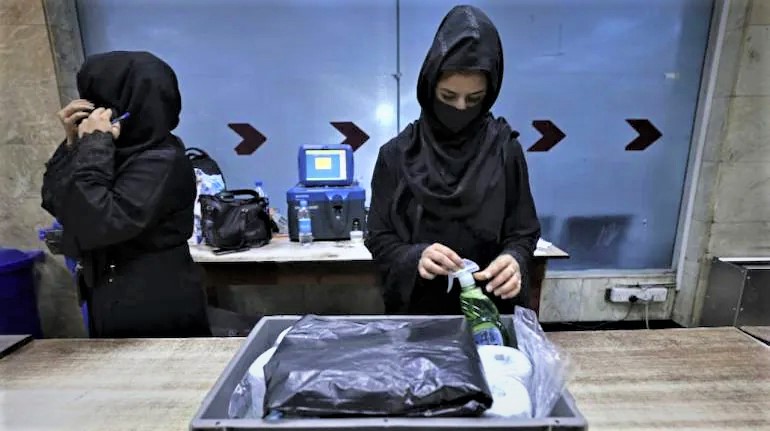Less than a month after the Taliban rolled into the Afghan capital, Rabia Jamal made a tough decision — she would brave the hard-liners and return to work at the airport.
With the group saying women should stay at home for their own security the risks were all too clear, but the 35-year-old mother of three felt she had little choice.
“I need money to support my family,” said Rabia, wearing a navy-blue suit and make-up.
“I felt tension at home… I felt very bad,” she told AFP. “Now I feel better.”
Of the more than 80 women working at the airport before Kabul fell to the Taliban on August 15, just 12 have returned to their jobs.
But they are among very few women in the capital allowed to return to work. The Taliban have told most not to go back until further notice.
Six of the women airport workers were standing at the main entrance on Saturday, chatting and laughing while waiting to scan and search female passengers taking a domestic flight.
Rabia’s sister, 49-year-old Qudsiya Jamal, told AFP the Taliban takeover had “shocked” her.
“I was very afraid,” said the mother of five, who is also her family’s sole provider.
“My family was scared for me — they told me not to go back — but I am happy now, relaxed… no problems so far.”
Women’s rights in Afghanistan were sharply curtailed under the Taliban’s 1996-2001 rule, but since returning to power the group claims they will be less extreme.
Women will be allowed to attend university as long as classes are segregated by sex or at least divided by a curtain, the Taliban’s education authority has said, but females must also wear an abaya, an all-covering robe, and face-covering niqab veil.
Still, Alison Davidian, a representative for UN Women in Afghanistan, warned on Wednesday that the Taliban were already neglecting their promise to respect Afghan women’s rights.
At the airport, which is returning to action after the hurried US withdrawal left it unusable, Rabia says she will keep working unless she is forced to stop.
Under new rules, women may work “in accordance with the principles of Islam,” the Taliban have decreed, but few details have yet been given as to what exactly that might mean.
“My dream is to be the richest girl in Afghanistan, and I feel I am always the luckiest,” said Rabia, who has worked since 2010 at the terminal for GAAC, a UAE-based company providing ground and security handling.
“I will do what I love until I am not lucky anymore.”
Rabia’s colleague, who gave her name as Zala, dreams of something completely different.
The 30-year-old was learning French in Kabul before she was forced to stop and stay at home for three weeks after the takeover.
“Good morning, take me to Paris,” she said in broken French, as her five colleagues burst into laughter.
“But not now. Today I am one of the last women of the airport.”
previous post
Related posts
- Comments
- Facebook comments




